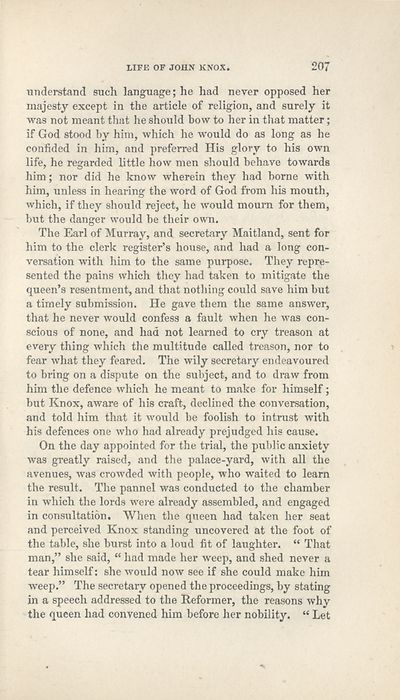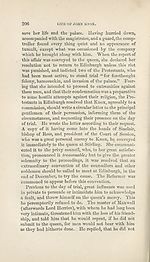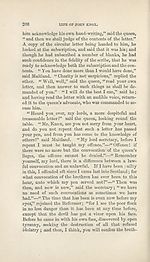Download files
Complete book:
Individual page:
Thumbnail gallery: Grid view | List view

OF JOHN KNOX.
207
understand such language; he had never opposed her
majesty except in the article of religion, and surely it
was not meant that he should bow to her in that matter;
if God stood by him, which he would do as long as he
confided in him, and preferred His glory to his own
life, he regarded little how men should behave towards
him; nor did he know wherein they had borne with
him, unless in hearing the word of God from his mouth,
which, if they should reject, he would mourn for them,
but the danger would be their own.
The Earl of Murray, and secretary Maitland, sent for
him to the clerk register’s house, and had a long con¬
versation with him to the same purpose. They repre¬
sented the pains which they had taken to mitigate the
queen’s resentment, and that nothing could save him but
a timely submission. He gave them the same answer,
that he never would confess a fault when he was con¬
scious of none, and had not learned to cry treason at
every thing which the multitude called treason, nor to
fear what they feared. The wily secretary endeavoured
to bring on a dispute on the subject, and to draw from
him the defence which he meant to make for himself;
but Knox, aware of his craft, declined the conversation,
and told him that it would be foolish to intrust with
his defences one who had already prejudged his cause.
On the day appointed for the trial, the public anxiety
was greatly raised, and the palace-yard, with all the
avenues, was crowded with people, who waited to learn
the result. The pannel was conducted to the chamber
in which the lords were already assembled, and engaged
in consultation. When the queen had taken her seat
and perceived Knox standing uncovered at the foot of
the table, she burst into a loud fit of laughter. “ That
man,” she said, “ had made her weep, and shed never a
tear himself: she would now see if she could make him
weep.” The secretary opened the proceedings, by stating
in a speech addressed to the Reformer, the reasons why
the queen had convened him before her nobility. “ Let
207
understand such language; he had never opposed her
majesty except in the article of religion, and surely it
was not meant that he should bow to her in that matter;
if God stood by him, which he would do as long as he
confided in him, and preferred His glory to his own
life, he regarded little how men should behave towards
him; nor did he know wherein they had borne with
him, unless in hearing the word of God from his mouth,
which, if they should reject, he would mourn for them,
but the danger would be their own.
The Earl of Murray, and secretary Maitland, sent for
him to the clerk register’s house, and had a long con¬
versation with him to the same purpose. They repre¬
sented the pains which they had taken to mitigate the
queen’s resentment, and that nothing could save him but
a timely submission. He gave them the same answer,
that he never would confess a fault when he was con¬
scious of none, and had not learned to cry treason at
every thing which the multitude called treason, nor to
fear what they feared. The wily secretary endeavoured
to bring on a dispute on the subject, and to draw from
him the defence which he meant to make for himself;
but Knox, aware of his craft, declined the conversation,
and told him that it would be foolish to intrust with
his defences one who had already prejudged his cause.
On the day appointed for the trial, the public anxiety
was greatly raised, and the palace-yard, with all the
avenues, was crowded with people, who waited to learn
the result. The pannel was conducted to the chamber
in which the lords were already assembled, and engaged
in consultation. When the queen had taken her seat
and perceived Knox standing uncovered at the foot of
the table, she burst into a loud fit of laughter. “ That
man,” she said, “ had made her weep, and shed never a
tear himself: she would now see if she could make him
weep.” The secretary opened the proceedings, by stating
in a speech addressed to the Reformer, the reasons why
the queen had convened him before her nobility. “ Let
Set display mode to:
![]() Universal Viewer |
Universal Viewer | ![]() Mirador |
Large image | Transcription
Mirador |
Large image | Transcription
| Antiquarian books of Scotland > Scotland/Scots > Life of John Knox ; and, The life of Alexander Henderson > (225) |
|---|
| Permanent URL | https://digital.nls.uk/131835004 |
|---|
| Description | Thousands of printed books from the Antiquarian Books of Scotland collection which dates from 1641 to the 1980s. The collection consists of 14,800 books which were published in Scotland or have a Scottish connection, e.g. through the author, printer or owner. Subjects covered include sport, education, diseases, adventure, occupations, Jacobites, politics and religion. Among the 29 languages represented are English, Gaelic, Italian, French, Russian and Swedish. |
|---|

